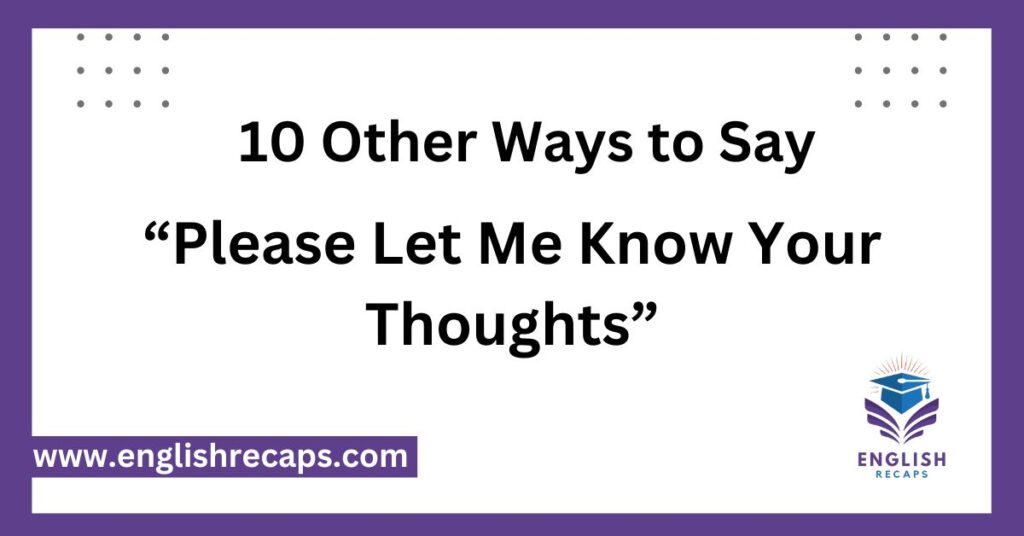Please let me know your thoughts are a common phrase used to request feedback or opinions. In professional environments, it’s a polite and open invitation for someone to share their insights or views on a topic. It helps foster clear communication by showing that you value the other person’s perspective.
However, in a business setting, the same phrase can start to feel repetitive or too casual. To keep your communication fresh and engaging, it’s important to switch things up. A simple tweak in wording can leave a stronger, more polished impression while still conveying the same message.
There are 10 professional synonyms you can use instead of “please let me know your thoughts.” These alternatives not only sound more refined but also suit different contexts, from formal emails to casual meetings. By using these phrases, you’ll show thoughtfulness and maintain a professional tone without sounding repetitive.
Is It Professional to Say “Please Let Me Know Your Thoughts”?
Please let me know your thoughts are a phrase often used in business. It’s a polite way to ask someone for their opinion. This phrase helps open communication and shows respect for others’ views. In emails, it is often used after giving details or making a suggestion. It can make the other person feel valued. However, it may not always sound professional in all situations. Sometimes, it can feel too informal.
Example:
Hi John,
I hope this message finds you well. I’ve attached the updated project proposal for your review. It includes the timeline adjustments we discussed during our last meeting. I believe these changes will help streamline our next steps and ensure we stay on track.
Please let me know your thoughts on the revisions. If there’s anything you feel needs adjustment, I’d be happy to discuss further.
Thanks for your time and input. Looking forward to hearing from you soon!
Best regards,
Sarah
Pros:
Shows you want feedback
Encourages open discussion
Polite and respectful
Cons:
Can sound too casual
Overused in many emails
May seem unprofessional in formal settings
10 Professional Synonyms for “Please Let Me Know Your Thoughts”
- I value your input.
- Your feedback would be appreciated.
- I’d love to hear your perspective.
- Could you share your thoughts on this?
- Please share your feedback.
- What are your thoughts on this?
- Your insights would be helpful.
- How do you feel about this?
- I’m eager to hear your views.
- Let me know your opinion.
I value your input.
I value your input to show that you respect someone’s opinions. It makes them feel appreciated for their feedback. This phrase is often used in formal settings to emphasize the importance of their contribution.
For example: you might write in an email:
Dear Emily, I’ve reviewed your suggestions for the new marketing strategy. I value your input and will consider your ideas carefully.
This phrase is formal and suitable for professional communication. It indicates that you take the person’s feedback seriously and are grateful for their effort.
You may wish to learn another related post: Thank You for Your Attention
Your feedback would be appreciated.
Your feedback would be appreciated and is used to politely ask for someone’s opinions or suggestions. It shows that you value their input and are open to their thoughts. This phrase is formal and often used in professional emails or reports.
For example:
“Hi Alex, I’ve attached the draft for the upcoming presentation. Your feedback would be appreciated before we finalize it.”
This phrase is formal and respectful. It clearly communicates that you value the person’s opinion and want their input to improve the work.
I’d love to hear your perspective.
I’d love to hear your perspective used to ask someone for their opinion. It shows you are interested in their unique view. This phrase works well in both formal and informal settings.
For example:
Hi Alex, we’re finalizing the new project plan. I’d love to hear your perspective on the proposed changes.
This phrase is friendly and engaging. It’s informal enough to use in casual conversations but also polite enough for professional emails.
Could you share your thoughts on this?
Could you share your thoughts on this? It is used to ask someone for their opinion or feedback. It shows you are interested in their perspective and value their ideas. This phrase is l and suitable for both emails and meetings.
For example:
“Hi Maria, I’m working on the new design for the website. Could you share your thoughts on this when you have a moment?”
This phrase is formal and shows respect for the person’s expertise. It invites them to provide their feedback in a clear and straightforward manner.
Please share your feedback.
Please share your feedback if it is used to request someone’s opinions or comments on something. It indicates that you are open to their suggestions and value their input. This phrase is formal and appropriate for professional contexts.
For example:
“Dear Tom, I’ve attached the project report for review. Please share your feedback to help us finalize the details.”
This phrase is formal and clearly asks for the person’s thoughts. It shows that you respect their opinion and want to incorporate their input into your work.
What are your thoughts on this?
What are your thoughts on this? is used to ask for someone’s opinion or ideas. It shows that you are interested in their perspective and value their input. This phrase can be used in both formal and informal settings.
For example:
“Hi Lisa, I’ve drafted the new policy proposal. What are your thoughts on this before we move forward?”
This phrase is versatile and suitable for various contexts. It invites the person to share their views clearly and directly.
Your insights would be helpful.
Your insights would be helpful if used to request someone’s expert opinions or suggestions. It indicates that their knowledge is valuable and needed. This phrase is formal and often used in professional contexts.
For example:
“Dear Jordan, we’re planning a new marketing strategy. Your insights would be helpful in shaping our approach.”
This phrase is formal and shows respect for the person’s expertise. It clearly communicates that their feedback will contribute to making informed decisions.
How do you feel about this?
How do you feel about this? It is used to ask someone for their personal opinion or emotional response. It shows you care about their feelings and perspective. This phrase is informal and best used in casual conversations.
For example:
“Hey Alex, I’m thinking of changing the project deadline. How do you feel about this adjustment?”
This phrase is informal and helps gauge how someone personally responds to a change or idea. It invites an honest and personal reaction.
I’m eager to hear your views.
I’m eager to hear your views used to express a strong interest in someone’s opinion. It shows that you are enthusiastic about their feedback and value their perspective. This phrase is formal and appropriate for professional settings.
For example:
“Dear Karen, I’ve completed the initial draft of the proposal. I’m eager to hear your views before we proceed.”
This phrase is formal and conveys a genuine interest in the person’s feedback. It highlights that their opinions are important to you and will influence the next steps.
You may wish to learn another related post:20 Other Ways to Say “Thank You for Clarifying”
Let me know your opinion.
Let me know your opinion is used to ask for someone’s personal views or feedback. It shows that you value their thoughts and want to hear what they think. This phrase can be used in both formal and informal settings.
For example:
“Hi Sarah, I’ve attached the design for the new logo. Let me know your opinion when you have a chance.”
This phrase is versatile and invites the person to share their thoughts clearly. It is direct and straightforward, making it suitable for various contexts.
FAQ’s
How to professionally say “let me know your thoughts”?
“Let me know your thoughts”.
“I would appreciate your feedback”.
“Please share your insights on this matter”.
“Your perspective would be valuable for this discussion”.
How do you say “please let me know politely”?
- Use “Could you please inform me?” to ask politely.
- Try “I would appreciate it if you could let me know.”
- Another option is “Please update me at your earliest convenience.”
How do you say “I want to hear your thoughts”?
- You can say, “I’d like to hear your opinion.”
- Another option is, “Please share your thoughts with me.”
- Or simply use, “Let me know what you think.”
How do you say I thought professionally?
To say “I thought” professionally, you might use “In my opinion” or “Based on my analysis”. For example:
you could write, “In my opinion, the new strategy will improve our results.” This phrasing maintains a formal tone and clearly conveys your perspective.
What’s another way to say your thoughts?
To express “I thought” professionally, use phrases like “My assessment is” or “It appears that”. For example:
say, “My assessment is that the proposal will enhance efficiency.” This approach presents your viewpoint with formality and clarity.
Conclusion
Incorporating 10 Professional Synonyms for ‘Please Let Me Know Your Thoughts‘ into your communication can significantly enhance your professional interactions. These synonyms offer a refined and formal approach to requesting feedback. By using diverse phrases, you avoid repetitive language and present yourself as more polished and considerate.
Using these professional alternatives helps convey your request for opinions in a respectful manner. For instance, phrases like “I value your input” or “Your feedback would be appreciated” not only make your requests sound more sophisticated but also show that you are genuinely interested in the other person’s perspective. Adopting these synonyms can improve the clarity and effectiveness of your communication, making your interactions more engaging and professional.
Revolutionizing the way apps are developed, Appkod stands at the forefront of mobile technology. As the demand for mobile apps continues to rise, Appkod simplifies the development process, empowering developers to create outstanding applications without the usual hurdles


